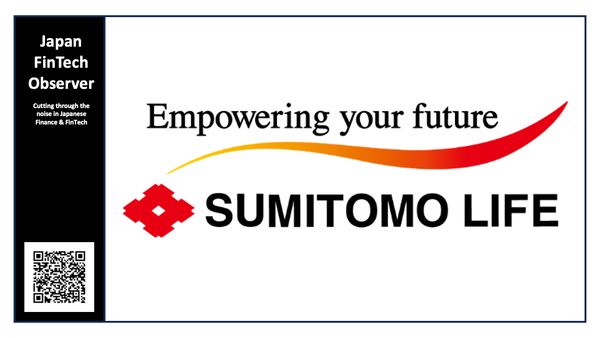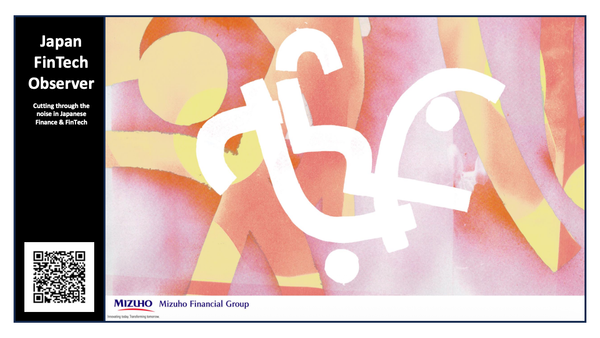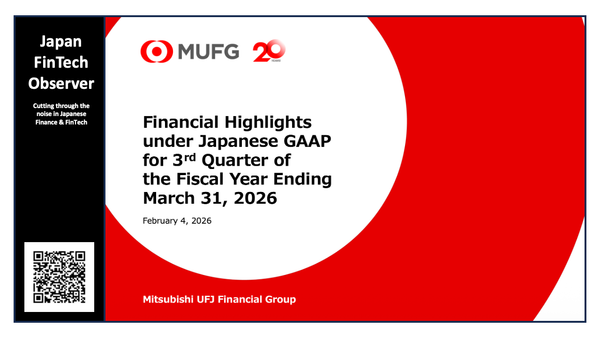Japan FinTech Observer #137

Welcome to the one hundred thirty-seventh edition of the Japan FinTech Observer.
The convergence is happening. The Financial System Council Working Group on Crypto-Assets has come to the conclusion that forcing crypto investments into the Payment Services Act, and is working on an approach to migrate the relevant parts to the Financial Instrument and Exchange Act (FIEA). At the same time, the Digital Asset Co-creation Consortium" (abbreviated as DCC, with 315 member organizations), hosted by Progmat, will establish the "Tokenization Law & Stock ST Working Group (WG)" and commence a joint study with the purpose to enable the transfer of rights for all securities, including stocks and investment trusts, on-chain and to maximize the benefits of Security Token (ST) implementation, as securities tokens to date could only cover real estate and some bonds.
Here is what we are going to cover this week:
- Venture Capital & Private Markets: Fivot completes Series B funding round totaling 2 billion yen; Funds completes Series E funding round of 1.8 billion yen; SMBC Asia Rising Fund leads WIZ.AI's Series B
- Banking: Tokyo Star Bank & Global Trust Networks to offer Financial Services to foreigners; SBI Holdings Second Quarter & Half-Year Financial Results; hedge funds disputing Shinsei buyout price cast cloud on listing; Mercari's First Quarter FinTech Results
- Payments: LY Corporation reported strong second quarter earnings, driven by PayPay; FSA Launches Payment Innovation Project (PIP); Megabanks approved for support by the FSA for FinTech PoC Hub to trial cross-border stablecoin payments; Stripe and NEC to provide face recognition payment service via Stripe Terminal; Infcurion's "Xard" supports launch of ETC card handling in "Money Forward Business Card"; NEC to acquire CSG, strengthening its position as a global leader in Digital Transformation (DX)
- Capital Markets: Progmat-led consortium to commence joint study on "Tokenized Stock" and "Tokenization Law"; the FSA has clarified that it is not appropriate to offer derivatives products referencing crypto-asset exchange-traded funds (ETFs) established outside Japan; JPX Chief on Corporate Governance Reform 2025; The 11th Annual Conference of the Principles held in Tokyo
- Digital Assets: the 5th Meeting of the Financial System Council Working Group on Crypto-Assets focused on consolidating previous discussions and presenting specific proposals for regulatory reforms concerning crypto assets in Japan, particularly addressing the shift of crypto assets towards investment purposes and the need for enhanced investor protection and market integrity
- The Last Word: The True Potential of the Japanese Economy
- The Very Last Word: Real Wages Continue Declining
Venture Capital & Private Markets
- Fivot completes Series B funding round totaling 2 billion yen: Fivot, a startup company aiming to become a challenger bank pioneering the future through "AI × Finance," has completed a funding round consisting of a 1 billion yen third-party allotment of shares in a Series B equity round and 1 billion yen in debt financing (loans), totaling 2 billion yen; Angel Bridge and Nissay Capital served as co-lead investors, with a total of 9 companies participating as investors; this brings the cumulative equity funding since founding to 2.5 billion yen
- Funds completes Series E funding round of 1.8 billion yen: Funds has completed a Series E funding round, raising a total of 1.83 billion yen; the round was led by "SMBC-GB Growth No. 1 Investment Limited Partnership," jointly operated by Global Brain Corporation and SMBC Edge Corporation; other investors include Asset Management One, one of Japan's largest asset management companies; PKSHA Technology, a leading AI development company; ALPHA, an independent emerging VC; and Quester Capital, a boutique investment bank based in Hong Kong, among others; the Series E round has been completed up to the 2nd close, and activities are continuing toward the final close
- SMBC Asia Rising Fund leads WIZ.AI's Series B: WIZ.AI, a Singapore-based AI company pioneering the enterprise application of large language models (LLMs) in Southeast Asia, has announced the successful closing of its Series B funding round, raising tens of millions of USD; the round was led by SMBC Asia Rising Fund, the corporate venture capital arm of Japan’s Sumitomo Mitsui Banking Corporation (SMBC); it saw participation from new strategic investors, including Beacon Venture Capital (the venture arm of Thailand’s Kasikorn Bank) and SM Investments Corporation; existing investors, including Singtel Innov8 (the venture arm of Singtel Group) and Granite Asia, also deepened their commitment, reaffirming their confidence in WIZ.AI’s technological leadership and market vision
Not FinTech
- HIRAC FUND has made an investment in E-SEP, which develops ceramic separation membranes; HIRAC FUND, operated by Money Forward Venture Partners, a group company of Money Forward, determined that E-SEP possesses technology to manufacture high-performance nano-ceramic separation membranes with high reproducibility, is already commercialized and highly evaluated by many chemical companies, and holds future potential to simultaneously solve multiple important issues toward carbon neutrality, and has made this investment
- miive, which provides “miive,” a point-based benefits platform utilizing Visa cards and a mobile app, has completed fundraising totaling approximately ¥1.5 billion in its Series B 1st round; this includes third-party allocation of new shares led by existing shareholder DNX Ventures, as well as participation and/or loans from financial institutions such as Aozora Corporate Investment, Sumitomo Mitsui Banking Corporation, Mizuho Bank, Hokkoku Bank, and Juroku Bank
Banking

- NTT DOCOMO has reported second quarter earnings, without too much detail on the newly acquired SBI Sumishin Net Bank, now rebranded as d Neo Bank; although NTT became the joint-largest shareholder in SBI Holdings in a parallel transaction, and has been progressing the integration between d Neo Bank and SBI Securities, the one-pager strategy lists Monex Securities only, a controlling interest in which had been previously acquired
- Tokyo Star Bank & Global Trust Networks to offer Financial Services to foreigners: Tokyo Star Bank and Global Trust Networks have signed a basic agreement and commenced collaboration to realize financial services for foreign residents in Japan; Tokyo Star Bank has supported the lives of foreign residents from a financial perspective through account opening assistance, housing loan provision, and multilingual support; meanwhile, GTN has supported the living foundation of foreign residents by providing one-stop services necessary for life in Japan, such as housing, telecommunications, and employment support; through this collaboration, both companies aim to integrate their strengths and create a new service model that unifies daily life and finance
- SBI Holdings Second Quarter & Half-Year Financial Results: SBI Holdings reported record-breaking performance for the first half of FY2025, driven by strong growth across most segments, particularly Financial Services and PE Investment; the Financial Services business grew +13.0% to JPY 118.0bn, marking a record high; the Banking Business was the main driver, growing +17.1% to JPY 73.6bn; the PE Investment Business experienced explosive growth, turning a prior year loss into a profit of JPY 110.5bn (a massive increase of +1,054.5% in revenue), primarily due to valuation gains on multiple equity holdings
- Hedge funds disputing Shinsei buyout price cast cloud on listing: Investors including Citadel and Norges Bank claim in court filings that the price offered to take SBI Shinsei Bank private in 2023 was too low; hedge funds Athos Capital and Maven Investment Partners are also named in a private court petition arguing that SBI Holdings' buyout of Shinsei at ¥2,800 a share was undervalued; if the court rules the buyout price was unfair, Shinsei may be ordered to pay the difference from a court-determined fair price, which could amount to millions of dollars
- Mercari's First Quarter FinTech Results: Mercari recorded a favorable start to the fiscal year in all three of Mercari Group's major businesses, with the recovery of the Marketplace GMV growth rate, the achievement of positive GMV growth in its US business, and the growth of FinTech credit services; consolidated revenue was 49.4B JPY (+10% YoY) and consolidated core operating profit was 9.3B (+128% YoY); going forward, Mercari aims to continue promoting product innovation by leveraging AI, and from Q2 onward, they aim to achieve their full-year financial forecast while strengthening the investment needed for growth in FY2027.6
Payments

- LY Corporation reported second quarter earnings last week; out of a significant JPY 43.5bn year-on-year revenue increase for the group, PayPay accounted for JPY 20.2bn, and LINE Bank Taiwan for JPY 4.7bn; while PayPay yoy revenue grew by 28.4%, "Other FinTech" revenue, including Line Bank Taiwan, grew by over 80%
- FSA Launches Payment Innovation Project (PIP): the FSA has launched the "Payment Innovation Project" (PIP) within the FinTech Proof-of-Concept Hub, specializing in the payment field; PIP has strategically assigned staff members with deep expertise in blockchain technology, related laws and regulations, and overseas trends to the support team to assist individual proof-of-concept experiments; applications received will be evaluated by the Financial Services Agency against the FinTech Proof-of-Concept Hub/Payment Innovation Project (PIP) checklist items (listed in the article) to determine whether support under this scheme is possible
- Megabanks approved for support by the FSA for FinTech PoC Hub: MUFG Bank, Mizuho Bank, Sumitomo Mitsui Banking Corporation, Mitsubishi UFJ Trust and Banking Corporation, and Progmat have announced that their joint stablecoin (SC) issuance and advanced cross-border settlement for a Mitsubishi Corporation proof-of-concept have both been approved to receive support from the Financial Services Agency of Japan’s FinTech PoC Hub; this is the first project supported by the Payment Innovation Project (PIP), and the 11th project overall supported by the FinTech Proof-of-Concept Hub
- Stripe and NEC to provide face recognition payment service via Stripe Terminal: Stripe and NEC have begun exploring integration of the Stripe Reader S700 payment terminal, compatible with the unified commerce solution Stripe Terminal, with NEC's face recognition payment service; by combining Stripe's payment terminals, payment services, and functions with NEC's face recognition technology, which boasts world-leading authentication accuracy, the companies aim to provide secure, simple, and convenient hands-free payments, enhancing customer experience value; Stripe and NEC will showcase this face recognition payment experience with the Stripe Reader S700 at the Singapore FinTech Festival from November 12 to 14
- Infcurion's "Xard" supports launch of ETC card handling in "Money Forward Business Card": Infcurion's next-generation card issuance platform "Xard" has been adopted by Money Forward for the handling of ETC cards in "Money Forward Business Card"; we have also checked in on Infcurion's stock price two weeks after its IPO, and might have well caught the bottom at the time of writing - from here, the stock closed about 6.5% higher
- NEC to acquire CSG, strengthening its position as a global leader in Digital Transformation (DX): NEC Corporation and CSG Systems International have announced they have entered into a definitive agreement under which NEC will acquire CSG for US$80.70 per share in cash, for a total enterprise value of approximately US$2.9 billion, or JPY438.5 billion, including debt; the transaction price represents a 17.38% premium over CSG’s closing price of US$68.75 on October 28, 2025, and a 23.07% premium to the volume-weighted average price (VWAP) of CSG common stock for the 30 days ending October 28, 2025
Capital Markets
- Progmat-led consortium to commence joint study on "Tokenized Stock" and "Tokenization Law": the "Digital Asset Co-creation Consortium" (abbreviated as DCC, with 315 member organizations), hosted by Progmat, will establish the "Tokenization Law & Stock ST Working Group (WG)" and commence a joint study with the purpose to enable the transfer of rights for all securities, including stocks and investment trusts, on-chain and to maximize the benefits of Security Token (ST) implementation; in this joint study, referring to overseas precedents that have enacted general laws concerning tokenization, the participants will develop a private-sector-led framework/draft for the "Tokenization Law" legislation to comprehensively resolve analog regulations premised on certificate issuance; furthermore, for stocks where domestic infrastructure has already been developed to a certain degree, the working group aims to identify areas where the utility of tokenization exceeds replacement costs and to design products/systems, thereby leading to the concrete formation of "tokenized stock" products; following the announcement of the WG establishment, the DCC will accept participation from related organizations as needed, with a kickoff in November 2025 and a goal to compile and publish a "Report" and "Tokenization Law (Draft)" by March 2026; additionally, the working group aims to implement individual tokenized stock product formation projects based on the "Report" starting in spring 2026
- The Financial Services Agency has updated its Q&As regarding the Financial Instruments Business, and clarified that it is not appropriate to offer derivatives products referencing crypto-asset exchange-traded funds (ETFs) established outside Japan; this clarification is based on the fact that the structuring and/or distribution of crypto-asset ETFs are currently not permitted in Japan; the newly added Question 6 explains that a derivative referencing a foreign crypto-asset ETF whose net asset value substantially tracks the price of the underlying crypto asset falls within the scope of a crypto asset or financial index derivative under Article 29-2(1)(ix) of the Financial Instruments and Exchange Act; the JFSA notes that, given the current regulatory environment, it considers such activity to be inappropriate from an investor protection perspective
- JPX Chief on Corporate Governance Reform 2025: Hiromi Yamaji, Group Chief Executive Officer of the Japan Exchange Group (JPX), spoke at the Foreign Correspondents' Club of Japan on November 5, 2025, focusing on Japan's ongoing corporate governance reforms, the resultant market momentum, and JPX’s strategic initiatives for future growth
- The 11th Annual Conference of the Principles, co-hosted by the International Capital Market Association (ICMA) and the Japan Securities Dealers Association (JSDA) in Tokyo, brought together key stakeholders to discuss the future of sustainable finance, with a strong focus on transition and nature-related financing; we share our key takeaways from the morning sessions we attended
Digital Assets
- The 5th Meeting of the Financial System Council Working Group on Crypto-Assets: The Financial Services Agency (FSA) hosted the 5th Meeting of the Financial System Council Working Group on Crypto-Assets on November 7, 2025; the meeting focused on consolidating previous discussions and presenting specific proposals for regulatory reforms concerning crypto assets in Japan, particularly addressing the shift of crypto assets towards investment purposes and the need for enhanced investor protection and market integrity; the discussion covered eight main themes: (I) Current Status and Challenges of Crypto Asset Transactions, and (II) Required Responses, including the legislative approach (Financial Instruments and Exchange Act - FIEA), information disclosure, business regulations, improving literacy, cybersecurity, market establishment rules, and unfair trading regulations (insider trading).
The Last Word: The True Potential of the Japanese Economy
The NLI Research Institute has published an article titled "The potential growth rate can be changed: The true potential of the Japanese economy," authored by Taro Saito.
Japan's post-pandemic economic recovery is a story of profound underperformance, a divergence from its global peers so stark it demands a fundamental re-evaluation of the nation's perceived economic limits. Correctly diagnosing the root cause of this sluggish growth is of paramount strategic importance; a misdiagnosis leads to ineffective, and potentially counterproductive, policy solutions.
The divergence in performance is stark. A comparison of real GDP, benchmarked against 2019 pre-pandemic averages, reveals that Japan's economy has expanded by a mere 2.1%. In contrast, the United States has surged ahead by 14.7%, and the Eurozone has grown by 6.1%. On an annualized basis over the past five years, Japan’s growth rate of 0.4% is dwarfed by the U.S. rate of 2.5% and the Eurozone's 1.1%.
The conventional explanation for this persistent underperformance points to a structural ceiling: a very low potential growth rate. Official estimates, such as the OECD’s 2025 forecast of just 0.17% for Japan, appear to validate this narrative of inevitable decline. This view suggests that Japan is fundamentally constrained by its supply-side capacity and that ambitious growth targets are unrealistic.
Saito's analysis posits a more dynamic and optimistic diagnosis: Japan's potential growth rate is not a fixed, structural barrier but a dynamic estimate that is heavily influenced by the trajectory of actual, demand-driven GDP. This paper argues that Japan's economic fate is not predetermined by demographic and supply-side constraints alone. Decades of anemic demand have created a self-fulfilling prophecy, artificially suppressing the nation’s measured potential. To chart a new course, one must first deconstruct the very concept of the potential growth rate itself.
The Very Last Word: Real Wages Continue Declining
The Itochu Research Institute's Associate Senior Research Fellow Sota Takano put out a new research note last week, analyzing the most recent monthly labor survey.
In September, the growth rate of total cash earnings was +1.9% year-on-year, accelerating from the previous month's +1.3%. This was mainly due to special payments (including bonuses) turning positive (from -7.8% to +4.5%). However, the situation where wage growth cannot keep pace with inflation continues, and real total cash earnings (adjusted for price increases) remained at -1.4%, marking the ninth consecutive month of decline.
Looking ahead, real wages are expected to turn positive by early 2026 at the latest. While the nominal wage growth rate is projected to remain around the low-to-mid 2% range during fiscal 2025, consumer price growth is expected to continue decelerating. Subsequently, with the 2026 spring wage negotiations (Shunto) expected to yield high wage increases of at least the mid-4% range, and with price increases stabilizing, we anticipate that positive real wage growth will become established next year.
Please follow us to read more about Finance & FinTech in Japan, like hundreds of readers do every day. Our short weekly digest, the “Japan FinTech Observer”, is published on LinkedIn, on Medium & Substack, or here on our own FinTech Observer website. Only the latter provides you with the option to subscribe to individual news stories as they are published.
Should you wish to further discuss the Japanese (or Asian) FinTech ecosystem, you may book a consultation via Intro - all proceeds flow towards covering the operating cost of the Tokyo FinTech Association, and research for the Japan FinTech Observer.




